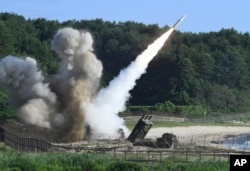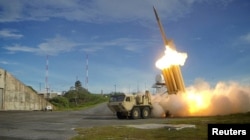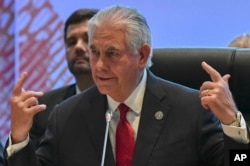South Korean President Moon Jae-in is voicing strong support for the U.S. policy of maximum pressure against North Korea, after Pyongyang rejected his outreach efforts as “insincere.”
Moon returned from vacation Monday to speak by phone with U.S. President Donald Trump for the first time since North Korea conducted its second successful test of an intercontinental ballistic missile (ICBM) over a week ago.
Both Washington and Seoul reiterated support for the new U.N. sanctions on North Korea that were passed unanimously Saturday by the 15 members of the Security Council that includes the U.S., China and Russia.
The new sanctions could deprive North Korea of $1 billion a year to fuel its illicit nuclear and ballistic missile program, by banning all exports of coal, iron, lead and seafood, and capping the number of North Korean laborers allowed to work outside the country.
A Japanese foreign ministry spokesman on Sunday also welcomed the tougher U.N. sanctions on North Korea and said it was time to exert more “effective pressure” on Pyongyang rather than to pursue dialogue.
Closer cooperation
The White House released a statement Monday on the call between Trump and Moon that said, “The leaders committed to fully implement all relevant resolutions and to urge the international community to do so as well.”
The Blue House also emphasized support for continued joint military exercises with the U.S.
“The two presidents decided to continue cooperation to deter and respond to North Korea's additional provocation based on a strong joint defense posture,” said South Korean Presidential Spokesman Park Soo-hyun at a briefing on Monday.
The two leaders also discussed Seoul's request for U.S. approval to double the destructive power of its own ballistic missile payload from 500 kilograms to one ton of explosives, and to increase their maximum range to 800 kilometers (500 miles). Under a longstanding bilateral missile guidelines agreement, the U.S. had imposed limits on South Korea's missile program to encourage the North to do the same. The two sides are expected to hold formal talks to amend the agreement that was last revised in 2002.
High-resolution radar a concern
Following North Korea's second ICBM test, South Korea also agreed to accelerate the deployment of the U.S. THAAD missile defense system, reversing a decision to first conduct an extended environmental study. Seoul's earlier delay was seen as a move to mitigate economic retaliation from China that reportedly imposed limits on travel and South Korean imports over THAAD.
Beijing objects to the U.S. advanced anti-missile battery in the region that can potentially monitor China's military activities using high-resolution radar. THAAD is designed to intercept medium range missiles at high altitudes, but not ICBMs.
On Sunday, Chinese Foreign Minister Wang Yi questioned South Korea's need for THAAD after meeting with Seoul's foreign minister Kang Kyung-wha at a regional security summit in Manila organized by the Association of Southeast Asian Nations (ASEAN).
“Will THAAD be able to intercept intercontinental ballistic missiles? I think it's quite clear to everyone, this is impossible?” said Wang.
Failed outreach
Since taking office in May President Moon Jae-in has tried to balance pressure with engagement to defuse tensions with the nuclear North Korean state. However Pyongyang has so far rejected offers of dialogue, cooperation and humanitarian assistance.
Speaking on the sidelines of the ASEAN Regional Forum Monday, North Korean Foreign Minister Ri Yong-ho told his South Korean counterpart Kang Kyung-wha that Seoul's proposals to improve ties with the North “lacks sincerity,” according to the Yonhap News Agency.
During his conversation with President Trump, Moon also said there is a need to show North Korea the door to dialogue is still open, but only after Pyongyang agrees to give up its nuclear program.
China proposes 'dual suspension'
At the ASEAN conference in Manila, Chinese Foreign Minister Wang Yi Monday encouraged the Moon administration to continue its efforts to improve inter-Korean relations and reduce the potential for conflict.
"My feeling is that the North did not entirely reject the positive proposals raised by the South," he said.
The Chinese official also said he hoped the United States would seriously consider China's proposed "dual suspension" of military drills in the South and missile tests in the North.
A strong message
U.S. Secretary of State Rex Tillerson said during the ASEAN forum that China and Russia's support for the latest sanctions sent a strong message to North Korea, but also said, “when the conditions are right then we can sit and have a dialogue around the future of North Korea, so they feel secure and prosper economically.”
However many regional security analysts remain skeptical that the new sanctions will succeed in pressuring the Kim Jong Un government to agree to talks on Washington's terms, and there are concerns that Beijing will selectively enforce the sanctions, as it had done in the past, for fear of destabilizing the region.
Youmi Kim contributed to this report.










